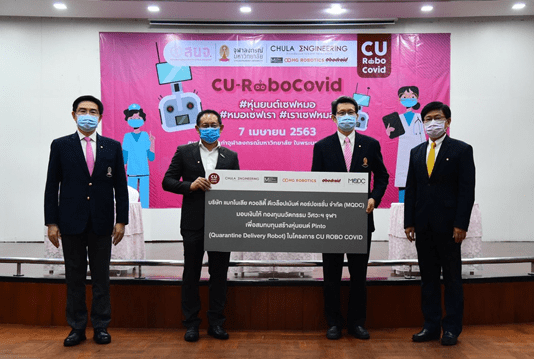Mr. Visit Malaisirirat (2nd from left), CEO of MQDC, participated in a ceremony to mark MQDC joining Chulalongkorn University’s Engineering Innovation Fund, with Prof. Dr. Supoj Teachavorasinskun (3rd from left), Dean of the Faculty of Engineering at Chulalongkorn University, who received the grant of THB2 million to help develop the robotic medical assistant ‘Pinto’, for delivering food and medicine to patients with the new 2019 coronavirus (COVID-19). The robot will help treat patients with COVID-19 at Chulalongkorn Hospital and hospitals around the country. The ceremony at the Chulalongkorn University Alumni Association under the King’s Patronage on Phayathai Road in Bangkok was attended by Prof. Dr. Bundit Ua-arporn (far left), President of Chulalongkorn University, and Mr. Viboon Rerksirathai (far right), President of the Chulalongkorn University Alumni Association under the King’s Patronage.
9 April 2020, Bangkok – MQDC is supporting the innovation fund at Chulalongkorn University’s engineering faculty to assist the ‘CU ROBO COVID’ initiative by the faculty and Obodroid Corporation Limited to develop ‘Pinto’, a prototype Quarantine Delivery Robot to help overcome the COVID-19 outbreak.
Mr. Visit Malaisirirat, CEO of Magnolia Quality Development Corporation Limited (MQDC), said that the ‘CU ROBO COVID’ team of MI Workspace from Chulalongkorn University’s engineering faculty together with HG Robotics and researchers from Obodroid Corporation Limited has innovated ‘Pinto’, a prototype robot to carry food and medicine to patients with the 2019 coronavirus disease (COVID-19).
MQDC has supported THB2 million to Chulalongkorn University’s Engineering Innovation Fund. The funding will help develop medical assistant robots that protect teams in hospitals from infection during the COVID-19 outbreak. The project has also developed ‘telepresence’ communications to use with Pinto robots. The system is already installed at the patient screening point at Chulalongkorn Hospital. Installations are underway at hospitals across the country to protect medical staff from infection and enhance safety for patients.
“In a situation where we are all facing a common crisis, MQDC is pleased to contribute as part of helping to ease the burden on medical personnel,” said Mr. Malaisirirat “The robot serves as an assistant to help patients and support everyone in performing their duties as smoothly as possible. I would like to thank medical personnel for their dedication in doing their jobs bravely, tirelessly daring to face challenges over the last several months.”
Dr. Mahisorn Wongphati, Chief Technology Officer of Obodroid and CEO of HG Robotics, said: “Obodroid and HG Robotics are delighted and honored to have the opportunity to work with the engineering team of Chulalongkorn University (MI Workspace) to jointly produce the ‘Pinto’ prototype Quarantine Delivery Robot and ‘telepresence’ communications. Obodroid’s team has produced software, provided equipment for making robots, and developed communications systems for remote patient care by doctors and nurses, including the use of other key equipment such as respirators. Through this initiative we will work together to produce robots for hospitals around the country, due to complete by May. The budget for each robot and its associated communication system is about THB50,000–70,000.”
Dr. Wongphati said that ‘Pinto’ is a relatively small robot. It can move around patients in their beds and is easy to disinfect, so germs cannot accumulate, helping doctors and nurses deal with the crisis. The robot is completely independent. The all-in-one system requires no additional tools or structures. Doctors and nurses can use it immediately. The robot lets them look after patients from a distance without needing to get close.
This distance reduces the risk for medical personnel and the need for virus protection kit, which is currently in short supply.
The delivery robot is derived from equipment used regularly in hospitals, such as trolleys that take food to patients. The system has been adjusted for remote control by a ‘telepresence’ communications system. Medical staff can look after patients conveniently and safely using a tablet screen. The system has been implemented at the patient screening point at Chulalongkorn Hospital, ready to be linked to the patient database. The Obodroid team will strive to produce robots to benefit medical staff nationwide.



